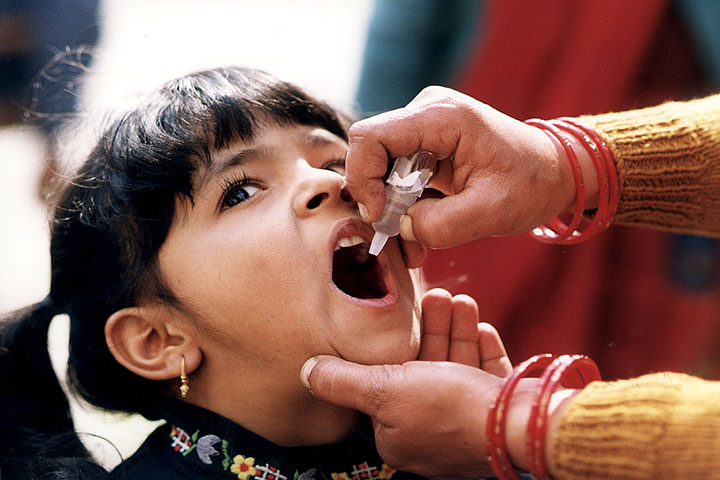

At its peak, in the 1950s, polio paralyzed and killed up to 500,000 people per year worldwide. By the 1960s, shortly after Jonas Salk invented the vaccine in 1955, that number dropped dramatically. Polio is no longer the mass killer it once was. But it still affects a handful of kids every year—in 2015, there were 74 reported cases in just two countries, according to the World Health Organization (WHO). Now, thanks to the billions of vaccines administered by the Global Polio Eradication Initiative (GPEI) since 1988, public health officials are on the cusp of eradicating the disease, which would make it the second human-hosted virus in history to be completely wiped out (the first was smallpox, in 1980).
Polio is caused by a virus that is spread between people, usually when a person ingests food or water that has been in contact with contaminated feces, according to the GPEI web site. Many people don’t display symptoms, so they continue to spread the virus as it reproduces in their intestines. That can quickly turn into an epidemic, especially in places with poor sanitation. Kids under the age of five are most susceptible to the disease.
2.5 billion children in more than 125 countries have received a polio vaccine, most orally (the first oral polio vaccine was created in 1961). Afghanistan and Pakistan are the only countries that have had wild (not vaccine-induced) cases of polio in the past two years. This year, there have only been nine. Officials think the disease could be wiped out in the next 12 months.
“We absolutely need to keep the pressure up, but we think we could reach the point where we have truly interrupted the transmission at the end of the year or the end of the low season [winter] next year,” Michel Zaffran, the director of polio eradication at WHO, told The Guardian.
One of the things officials are doing to “keep the pressure up” is switching the formula of the vaccine because one of the three strains of the virus has already been eradicated, so there’s no need to expose patients to additional risk by including it in the vaccine. Starting on April 17, within the span of two weeks, doctors in 155 countries would start using the new formulation, making it the largest vaccine rollout in human history, according to a press release.
The WHO will be concentrating its eradication efforts on two districts in Pakistan as well as its capital, Karachi, along with 47 districts in Afghanistan. One of the biggest issues in Afghanistan is that 32 of those districts are under the control of anti-government forces, as Motherboard reports.
Polio infections sometimes spike in the summer. Even if that happens this summer, officials hope to report no new cases caused by the wild virus next year.
